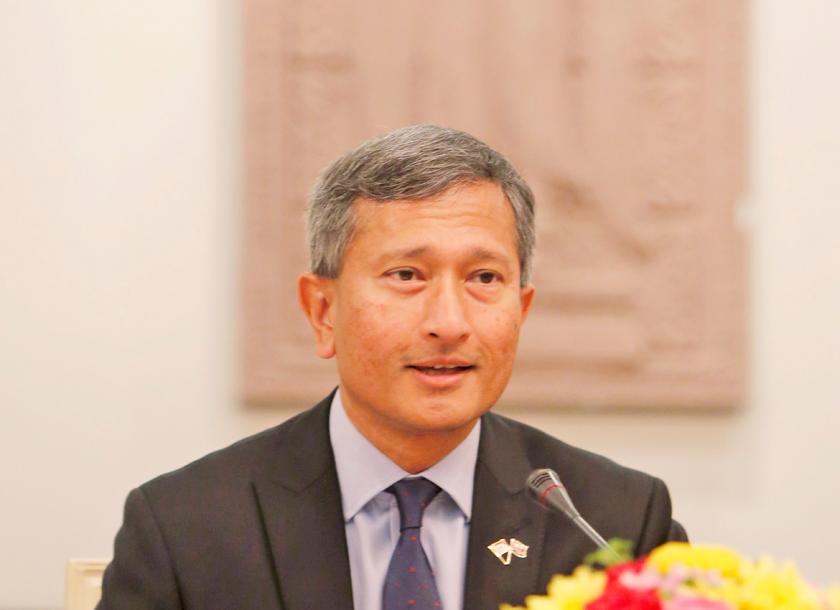ASEAN’s future bright for next 50: chair
Singapore, as the new ASEAN chair, is confident that ASEAN’s prospects are bright for the next 50 years.
Speaking at a public lecture on ASEAN at the Yusof Ishak Institute on Tuesday, Singapore Foreign Minister Vivian Balakrisnan said that had ASEAN not been formed 50 years ago, the region would have become a collection of proxies and vassal states to the major powers.
He said he is “optimistic” that ASEAN’s prospects are bright as it steps into the next 50 years.
ASEAN’s unity has been a recipe for peace, prosperity, and economic transformation over the past 50 years, he said, adding that it lent the region credibility and relevance to major powers.
“It’s imperative that we do not break ranks, and we do not sacrifice the long-term regional good in favour of narrower, short-term national interests, otherwise, no one will take us seriously,” said the minister, noting that leaders of major powers like the US, China and India make the time to attend ASEAN gatherings and to hear what the bloc has to say.
He noted that ASEAN will always be affected by external forces.
“The challenge is whether the external tsunamis will overwhelm or divide us, or whether we collectively build a bigger, stronger ship that will allow us to navigate out of danger and to expand opportunities for all our people,” he added.
That’s why Singapore, as the new chair of ASEAN, will focus on strengthening resilience and expanding innovative capacity, he said.
It will focus on the digital revolution and e-commerce, investing in people – particularly young people, as 60 percent of ASEAN’s population is under 35 – strengthening economic resilience, and on stepping up regional economic partnerships.
Southeast Asian countries must step up their fight against religious militancy taking root in the region, including in Myanmar’s troubled Rakhine State, Vivian said.
He said the weakening of Islamic State (IS) in the Middle East and the recent occupation of the Philippine town of Marawi by IS-aligned gunmen had renewed concern that the region could become a magnet for militants.
“We saw some returning fighters to Marawi in the southern Philippines, and there are other potential terrorist hotbeds in our region,” Vivian said.
“Our concern about Rakhine State is related to our anxiety that this could become another sanctuary for militants, another hotbed of extremism,” he said. “It is not just a Middle East phenomenon.” Singapore and other ASEAN countries have offered humanitarian help for the estimated 620,000 minority people who fled the Rakhine violence to Bangladesh.
Singapore Prime Minister Lee Hsien Loong told the ASEAN summit in November that the theme of its tenure will be resilience and innovation.
ASEAN members have pledged greater cooperation and intelligence-sharing to combat the threat of Islamic militancy.
The mostly Christian Philippines has over the past year faced the region’s most serious militant violence, which began when hundreds of gunmen, including some from elsewhere in the region, occupied Marawi, sparking the country’s most serious fighting since World War II.
Vivian also said that ASEAN is at an “inflection point” today due to shifts in geopolitical power, the rise of the middle class, and global threats like extremism, adding that the regional bloc has to grapple with challenges posed by 10 highly diverse member countries – in terms of size, population, economic policy, and government. So consensus is crucial for ASEAN unity, he said.
“Consensus is a design feature because of the great diversity of ASEAN. It forces us to take an enlightened long-term view of our own national interests vis-a-vis the larger, long-term regional interest,” he said, adding that consensus allows ASEAN to achieve more durable solutions.
Throughout the lecture, Vivian emphasised the importance of interdependence. “You gain more by working together, investing in one another and by trading with one another, because the opposite scenario is to divide the world into rival blocs, insist on narrow independence, engage in zero-sum competition and, ultimately, proxy wars,” he said.
He said that ASEAN does not take sides. While acknowledging that there may be disagreements, he said that it “does not make sense for you to let the disagreement derail the overall relationship.”
On ASEAN’s relations with superpowers, he said the bloc should be able to tell them, “Don’t force us to choose sides, because we are a region with great opportunity and there’s more than enough space and opportunity for everyone, and we can achieve a win-win outcome for all.”
The minister noted that the relationship between the US and China is at its “most delicate and sensitive,” and what happens there has “tremendous impact” on ASEAN. There may be competition and temptations to go back to old habits, according to him, but he hopes that both countries’ dependence on the other will help “cooler heads” prevail.
For next year’s meetings, he said he hopes to see leaders spend “quiet time” with each other, without an audience, so that they can build mutual trust and understand each others’ fears and aspirations. This will enable them to find the consensus needed to move forward on issues. He added that Singapore will be an honest broker to facilitate resolution, giving as an example the progress made on the South China Sea in November.
Vivian said he hopes there will be no trade wars next year and that the Trans Pacific Partnership trade pact will be settled by then.
Also on the table in 2018 will be the search for opportunities for ASEAN citizens, digitally integrating the region, investing in infrastructure, and emphasising interdependence.
“It is not in anyone’s interest to build walls, or start a war, or engage in zero-sum games, or to force us to choose sides,” he said.
Source: https://www.mmtimes.com/news/aseans-future-bright-next-50-chair.html


 English
English




